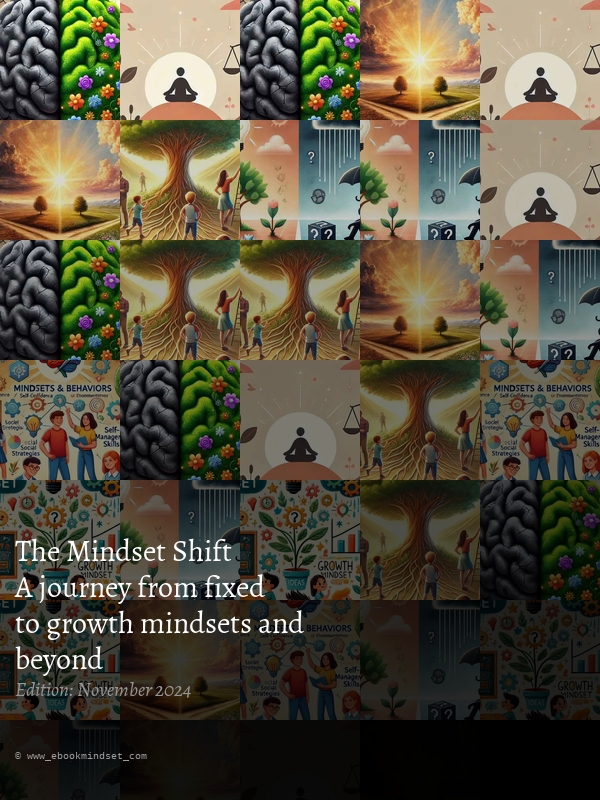Understanding the Science Mindset: A Comprehensive Guide
In today's rapidly evolving world, characterized by constant change and unprecedented challenges, the ability to think critically and adapt swiftly is no longer a desirable trait; it's a necessity. A science mindset—a way of thinking that emphasizes curiosity, skepticism, and evidence-based reasoning—significantly enhances decision-making, problem-solving abilities, and overall comprehension. This comprehensive guide delves into the intricacies of the science mindset, exploring its profound importance and providing practical strategies for cultivating it within various aspects of life.
What is a Science Mindset?
A science mindset prioritizes inquiry, experimentation, and the rigorous evaluation of evidence over assumptions, biases, and anecdotal evidence. It's a dynamic approach to understanding the world, characterized by:
- Curiosity: A deep-seated eagerness to learn, explore, and discover. This isn't passive curiosity; it's an active pursuit of knowledge, driven by a genuine desire to understand the "why" and "how" behind phenomena. It involves asking probing questions, challenging existing assumptions, and seeking out new information from diverse sources.
- Skepticism: A critical attitude towards claims, demanding rigorous evidence before accepting them as true. This isn't about cynicism or negativity; rather, it's about maintaining a healthy dose of intellectual doubt, requiring substantial proof before drawing conclusions. It involves questioning sources, evaluating the methodology behind research, and considering alternative explanations.
- Adaptability: A willingness to revise one's beliefs and understanding in light of new evidence. This requires intellectual humility—the recognition that one's current understanding might be incomplete or even incorrect. It involves embracing uncertainty, acknowledging limitations, and being open to revising perspectives based on new data or insights.
- Empirical Evidence: A reliance on observable and measurable data, gathered through systematic observation and experimentation. This emphasizes objective data over subjective opinions or beliefs. It involves designing experiments, collecting data, analyzing results, and drawing conclusions based on the evidence gathered, not on preconceived notions.
- Systematic Approach: A structured and methodical way of investigating questions and solving problems. This involves defining problems clearly, formulating hypotheses, designing experiments to test hypotheses, analyzing data, and drawing conclusions based on the findings. It also includes documenting the entire process for transparency and reproducibility.
Crucially, this mindset transcends the boundaries of scientific disciplines. Its principles and practices are applicable and highly beneficial across a vast spectrum of endeavors, from business and education to personal development and navigating the complexities of daily life.
The Importance of a Science Mindset
Enhancing Decision-Making
A science mindset dramatically improves decision-making processes. By adopting a hypothesis-driven approach, individuals can more effectively evaluate different options, anticipate potential consequences, and mitigate risks. Instead of relying on intuition or gut feelings, decisions are based on evidence and data, leading to more informed and rational choices. Methods like the Upside-Down Pyramid of Design, which prioritize the process of design and development, further exemplify this approach. This method reduces risks through careful planning, iterative testing, and continuous improvement, ensuring that decisions are not only informed but also adaptable.
Fostering Growth Mindsets
The science mindset is intrinsically aligned with the principles of growth mindsets, as popularized by Carol Dweck. It emphasizes the belief that abilities and intelligence are not fixed traits but rather malleable qualities that can be developed through dedication, effort, and perseverance. Research extensively demonstrates the positive correlation between growth mindsets and improved academic performance, increased resilience, and enhanced adaptability. A science mindset fosters this growth by encouraging continuous learning, embracing challenges as opportunities for growth, and viewing setbacks as valuable learning experiences.
Improving Problem-Solving Skills
Critical thinking is the cornerstone of effective problem-solving, and the science mindset significantly enhances this ability. It encourages individuals to analyze situations from multiple perspectives, identify underlying assumptions, and actively seek the simplest, most parsimonious explanations. This systematic approach reduces biases and cognitive errors, leading to more creative and effective solutions. The iterative process of hypothesis testing, experimentation, and analysis inherent in a science mindset allows for continuous refinement of solutions, resulting in better outcomes.
Navigating Change
Adaptability is paramount in today's dynamic and rapidly changing world. The science mindset cultivates this crucial skill by promoting flexibility and openness to new ideas. It encourages individuals to be willing to revise their beliefs and understanding when presented with compelling new evidence. Being willing to change one's mind based on new information is not a sign of weakness but rather a hallmark of intellectual integrity and an essential component of personal growth and effective leadership in any field.
How to Cultivate a Science Mindset
Developing a robust science mindset is not a passive process; it requires intentional practice, consistent self-reflection, and a commitment to continuous learning. Here are several key strategies:
- Embrace Curiosity: Nurture a genuine sense of wonder about the world. Actively seek out new information, ask probing questions, and engage in lifelong learning. Challenge yourself to explore topics outside your comfort zone and embrace the joy of discovery. This involves actively seeking out diverse perspectives and challenging existing assumptions.
- Practice Critical Thinking: Develop the habit of challenging assumptions and evaluating evidence rigorously before forming conclusions. Don't accept information at face value; instead, scrutinize its source, methodology, and potential biases. Utilize tools such as:
- Critical Filtering: Analyze information using criteria such as specificity (is the information precise and detailed?), simplicity (is the explanation concise and easily understandable?), and verification (can the information be confirmed from multiple reliable sources?).
- Socratic Questioning: Employ open-ended questions to probe deeper into issues, challenge assumptions, and explore different perspectives. This technique encourages critical analysis and promotes a more nuanced understanding of complex topics.
- Logical Fallacies Awareness: Learn to identify common logical fallacies (e.g., confirmation bias, straw man arguments, ad hominem attacks) to prevent flawed reasoning and strengthen critical thinking skills.
- Conduct Experiments (Even Small Ones): Treat decisions and actions as testable hypotheses. Measure the effectiveness of different approaches, gather data, and analyze the results to learn what works and what doesn't. This approach encourages a data-driven approach to problem-solving and decision-making.
- Reflect on Experiences: Regularly analyze your successes and failures to identify patterns, learn from mistakes, and refine your approaches. This reflective practice is crucial for continuous improvement and personal growth. Maintain a journal to record observations, experiments, and insights.
- Collaborate with Others: Engage in discussions with individuals holding diverse perspectives. This exposes you to different viewpoints and challenges your assumptions, leading to a more refined and nuanced understanding of complex issues. Active listening and respectful dialogue are key elements of successful collaboration.
- Stay Open-Minded: Be willing to revise your beliefs and understanding when presented with new evidence. Embrace uncertainty as an opportunity for learning and growth. Recognize that your current understanding is always subject to revision in light of new information and insights. Intellectual humility is essential for embracing new knowledge and adapting to change.
- Seek Diverse Information Sources: Avoid relying solely on a single source of information. Consult multiple sources from different perspectives to gain a more comprehensive understanding of any topic. Evaluate the credibility and potential biases of each source before accepting information as factual.
Applications of a Science Mindset
In Education
Educators can significantly enhance the learning experience by fostering a science mindset among students. This involves implementing inquiry-based learning methodologies, emphasizing exploration, experimentation, and critical thinking over rote memorization. Growth mindset interventions and programs have consistently demonstrated their efficacy in improving student performance, resilience, and overall academic success. By encouraging curiosity, questioning, and evidence-based reasoning, educators empower students to become active and engaged learners.
In Business
In the competitive landscape of the business world, a science mindset provides a significant competitive edge. It fosters innovation by encouraging experimentation, iterative development, and data-driven decision-making. Companies that embrace hypothesis testing, rigorous data analysis, and continuous improvement often outperform their competitors. Startups, in particular, frequently benefit from a science mindset, using it to adapt quickly to market changes, refine their products based on customer feedback, and achieve remarkable revenue growth. This approach minimizes risks and maximizes opportunities for success.
In Personal Life
The benefits of a science mindset extend far beyond the realms of education and business. It plays a crucial role in enhancing mental health and overall well-being by promoting resilience against stressors. By viewing challenges as opportunities for learning and growth, individuals can navigate life's difficulties more effectively. A science mindset fosters a sense of control over one's life and promotes proactive strategies for managing stress and achieving personal goals. It helps individuals develop more realistic expectations, make more informed decisions, and adapt more effectively to life's inevitable changes.
Conclusion
The science mindset is an invaluable asset for navigating the complexities and uncertainties of the modern world. By fostering curiosity, critical thinking, adaptability, and evidence-based reasoning, individuals enhance their decision-making abilities, problem-solving skills, and overall resilience. Embracing a scientific approach empowers individuals to adapt effectively to change, learn from both successes and failures, and thrive amidst uncertainty. Cultivating a science mindset is not merely beneficial; it's essential for success in today's world, leading to more informed choices, greater fulfillment, and a more empowered life.




